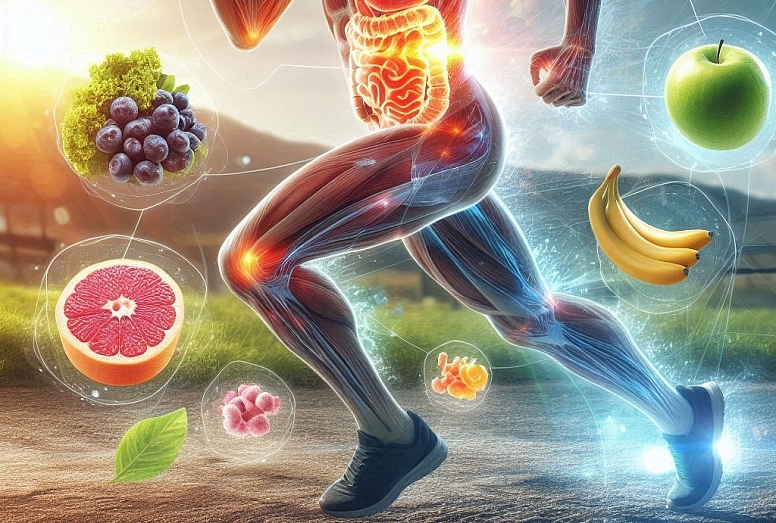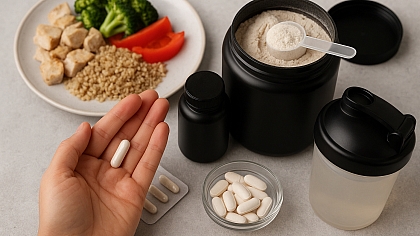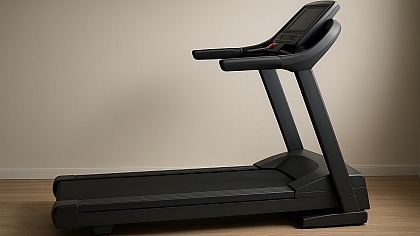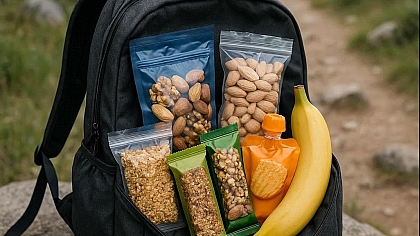
The Connection Between Gut Health and Fitness Performance
Your gut does more than just digest food—it plays a crucial role in energy levels, recovery, and even muscle growth. Emerging research shows that a healthy gut microbiome can boost endurance, reduce inflammation, and improve nutrient absorption, all of which directly impact your fitness results.
Here’s how your gut health affects your workouts—and what you can do to optimise both.
How Your Gut Impacts Fitness Performance
1. Energy Production & Nutrient Absorption
- 70% of your immune system resides in the gut. A balanced microbiome helps break down food into usable energy.
- Short-chain fatty acids (SCFAs), produced by good bacteria, enhance carbohydrate metabolism and muscle glycogen storage.
- Leaky gut (intestinal permeability) can lead to fatigue, bloating, and poor recovery.
Study: Athletes with diverse gut microbiomes had 12% better endurance performance (Journal of the International Society of Sports Nutrition).
2. Inflammation & Recovery
- A healthy gut reduces systemic inflammation, speeding up muscle repair.
- Probiotic strains (like Lactobacillus and Bifidobacterium) lower post-workout soreness.
- Dysbiosis (gut imbalance) increases cortisol, slowing recovery.
3. Mental Focus & Motivation
- 90% of serotonin (the "feel-good" hormone) is produced in the gut.
- Poor gut health is linked to brain fog and low workout motivation.
Signs Your Gut Is Affecting Your Fitness
✔ Frequent bloating during/after workouts
✔ Unexplained fatigue despite good sleep
✔ Slow recovery between sessions
✔ Sugar cravings post-exercise
✔ Frequent illnesses (weakened immunity)
How to Improve Gut Health for Better Performance
1. Eat More Gut-Friendly Foods
| Food | Benefit | Best For |
|---|---|---|
| Fermented foods (kimchi, kefir) | Boosts probiotics | Digestion, immunity |
| Resistant starch (cooled potatoes, green bananas) | Feeds good bacteria | Energy metabolism |
| Bone broth | Repair the gut lining | Recovery, joint health |
| Polyphenol-rich foods (berries, dark chocolate) | Reduces inflammation | Endurance |
2. Avoid Gut Disruptors
- Excessive sugar feeds harmful bacteria
- Artificial sweeteners – May alter microbiome balance
- NSAIDs (like ibuprofen) – Can damage the gut lining
- Chronic stress reduces microbial diversity
3. Time Your Meals for Optimal Digestion
- Pre-workout (2-3 hrs before): Easy-to-digest carbs + moderate protein (oatmeal + whey)
- Post-workout (within 45 min): Fast-absorbing protein + fiber (smoothie with banana + collagen)
- Before bed: Casein protein or kefir to support overnight gut repair
4. Consider a Probiotic (If Needed)
- Look for strains like B. coagulans (for protein absorption) and L. plantarum (for inflammation).
- Best for: Athletes with frequent bloating, gas, or food sensitivities.
The Gut-Muscle Axis: How Bacteria Affect Gains
Recent studies show that certain gut bacteria:
- Increase amino acid uptake → better muscle protein synthesis
- Enhance creatine production → improved strength output
- Reduce oxidative stress → faster recovery
Athlete Case Study: Marathon runners with higher Prevotella bacteria had 5% faster race times due to enhanced carb metabolism.

FAQs
Q: How long does it take to improve gut health?
A: 2-4 weeks with consistent diet changes, but full microbiome shifts take 3-6 months.
Q: Can gut health affect weight loss?
A: Yes! Poor gut flora slows metabolism and increases fat storage hormones.
Q: Are protein powders bad for the gut?
A: Only if they contain artificial sweeteners (like sucralose). Opt for clean, fermented, or collagen-based proteins.
Q: Does alcohol ruin gut health?
A: More than 2-3 drinks/week reduces microbial diversity and impairs recovery.
The Gut-Immune-Fitness Triad: Why Athletes Can't Afford to Neglect Gut Health
New research reveals a powerful three-way connection:
- 70% of immune cells reside in gut-associated lymphoid tissue (GALT)
- Overtraining syndrome correlates strongly with gut dysbiosis
- Vaccine effectiveness in athletes improves with microbiome diversity
A 2023 study in Frontiers in Immunology found that athletes taking probiotics:
✓ Had 42% fewer upper respiratory infections
✓ Maintained training consistency 3 weeks longer per season
Sport-Specific Gut Microbiomes: What Elite Athletes Reveal
Analysis of professional athletes' gut bacteria shows unique patterns:
- Endurance athletes have more Prevotella for carb metabolism
- Powerlifters show higher Methanobrevibacter for protein utilisation
- Gymnasts possess diverse Bifidobacterium for joint inflammation control
Practical application: While we can't all have elite microbiomes, we can train our guts for our specific sports through targeted nutrition.
The Fibre Paradox: Why Some Athletes Struggle
While fibre is crucial for gut health, many athletes experience:
- Bloating during competitions from sudden fibre increases
- Unexpected energy crashes from rapid SCFA production
Solution: Implement the 10% Rule - increase fibre intake by just 10% weekly until reaching 30-50g/day. This allows microbial adaptation without performance disruption.
Gut-Brain-Muscle Signalling: The New Performance Frontier
Cutting-edge science identifies three key communication pathways:
- Vagus nerve - Sends gut signals directly to muscles
- Myokines - Muscle-generated proteins that alter gut bacteria
- Bile acid metabolism - Affects both endurance and strength
Implication: Your post-workout meal doesn't just feed muscles—it programs your microbiome for future performance.
The Hidden Impact of Travel on Athletic Gut Health
Frequent training trips and competitions disrupt microbiomes through:
- Aeroplane food (low-fibre, high-preservative)
- Time zone changes alter gut motility
- Unfamiliar water sources introduce new microbes
Pro athlete protocol:
- Pack travel-sized probiotics
- Drink only bottled or filtered water
- Include a daily resistant starch source (green banana flour works well)

Gut Health Blood Markers Every Athlete Should Know
Ask your doctor about these tests at annual physicals:
- Zonulin (leaky gut marker)
- Calprotectin (gut inflammation)
- SCFA levels (microbiome activity)
- Lipopolysaccharides (LPS) (bacterial endotoxins)
Optimal ranges differ for athletes - for example, slightly elevated LPS may indicate beneficial bacterial growth from intense training.
The Circadian Rhythm of Your Gut Microbes
Your microbiome follows a daily cycle that affects performance:
- Morning: Best for protein absorption (higher protease enzymes)
- Afternoon: Peak carb metabolism (amylase activity peaks)
- Evening: Optimal fat processing (lipase production increases)
Training hack: Time your macronutrients to your gut's natural rhythm for enhanced absorption.
Action Plan: 7-Day Gut Reset for Athletes
- Morning: 1 tbsp apple cider vinegar in water
- Pre-workout: 1/2 green banana
- Post-workout: Fermented protein shake
- Lunch: 2 cups leafy greens + 1 tbsp extra virgin olive oil
- Dinner: 1 cup cruciferous vegetables + 4 oz fatty fish
- Before bed: 1 cup kefir or 1 probiotic capsule
- Daily: 5 minutes of diaphragmatic breathing
Train Your Gut Like You Train Your Body
Just as you progressively overload muscles, you should gradually increase fibre, probiotics, and anti-inflammatory foods to build gut resilience.
Action Step: Add one gut-friendly food (like sauerkraut or chia seeds) to your diet this week and notice any changes in energy or recovery.









